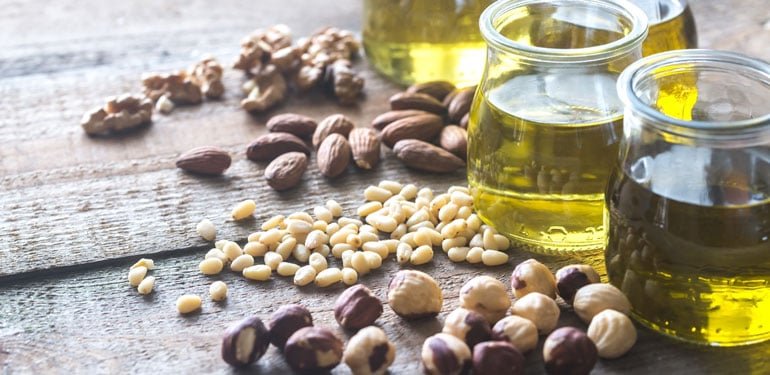What is edible oil?
Edible oil refers to any kind of oil suitable for human consumption. These oils are usually derived from plants, nuts, or seeds and are used for a variety of cooking purposes. Edible oils can be used for cooking, frying, baking, and as seasonings in salads and other dishes. They are common ingredients in many different dishes and are often an essential part of a healthy & balanced diet.
There are many different types of edible oils, each with their own properties and uses. Here are some examples:
Olive Oil:
Olive oil is a type of oil made by pressing olives and has been used for centuries for its health benefits. The benefits of consuming olive oil include lowering LDL (bad) cholesterol levels. These include improved heart health due to its high content of healthy fats that can lower blood pressure, reduce inflammation in the body, and protect the brain from cognitive decline.
Coconut oil:
Coconut oil is a type of edible oil extracted from the pulp of coconuts and used in many cuisines around the world. Its high saturated fat content has raised concerns about its health effects, but some studies suggest that coconut oil may offer health benefits. Potential benefits include improved heart health, weight management, skin health, and brain health.
Sunflower oil:
Sunflower oil is a popular edible oil extracted from sunflower seeds and is known for its many health benefits. It is high in monounsaturated and polyunsaturated fats and lowers LDL cholesterol. may improve heart health by reducing the risk of heart disease. Sunflower oil is also rich in omega-6 fatty acids, vitamin E, and choline, which may promote anti-inflammatory benefits, maintain healthy skin, support brain health, and strengthen the immune system.
Soybean oil:
Soyabean oil is a type of edible oil derived from soybeans and is often used in cooking. It has several potential health benefits, including lowering LDL cholesterol levels and improving heart health by raising HDL cholesterol levels. The omega-3 and omega-6 fatty acids found in soybean oil have anti-inflammatory properties that help reduce the risk of chronic diseases such as arthritis, heart disease, and cancer. Soybean oil is rich in vitamin K, vitamin E, and phytosterols.
Are These Oils Really Edible?
Edible oils are generally safe to consume and have some health benefits when consumed in moderation. However, edible oils have some downsides to consider.
Edible oils are a rich source of essential fatty acids and other nutrients important for maintaining good health. Provides energy to the body and aids in the absorption of fat-soluble vitamins.
Certain oils like olive oil and canola oil have been associated with reducing the risk of heart disease and improving heart health. Whereas such as coconut oil, have been shown to have antibacterial properties and may help protect against certain infections.
Excessive consumption of cooking oils can lead to weight gain and other health problems because oils are high in calories and can easily exceed your daily calorie needs if consumed in excess. Palm oil and hydrogenated vegetable oils are high in saturated and trans fats, and excessive consumption of these can increase your risk of heart disease and other health problems. Palm oil is also linked to deforestation and other environmental problems.
Overall, cooking oils can be a healthy part of a balanced diet when consumed in moderate and appropriate proportions. Choose oils high in healthy fats and avoid saturated and trans fats. It is important to avoid oils that are high in fat. In addition, it is important to consider the environmental impact of producing certain edible oils and choose sustainable options whenever possible.

